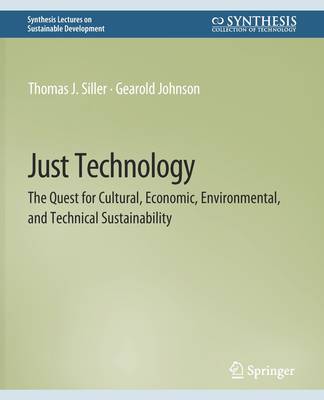
- Retrait gratuit dans votre magasin Club
- 7.000.000 titres dans notre catalogue
- Payer en toute sécurité
- Toujours un magasin près de chez vous
- Retrait gratuit dans votre magasin Club
- 7.000.0000 titres dans notre catalogue
- Payer en toute sécurité
- Toujours un magasin près de chez vous
Just Technology
The Quest for Cultural, Economic, Environmental, and Technical Sustainability
Thomas J Siller, Gearold Johnson
21,45 €
+ 42 points
Format
Description
To address the complexity of today's global challenges requires new ways of thinking. The idea that technology is always the best, maybe only, approach worth taking needs to be reconsidered. Sustainable approaches must also draw from non technological areas. To that end, this book introduces the idea of just technology by rephrasing the idea of just war in order to include concepts of sustainability in future engineering design. The book begins by defining justice and relating these definitions to technology. This is followed by illustrating several notions of sustainability and the awareness that needs to be focused on societal challenges due to the finite resources available in the natural world. Four questions are enumerated to be addressed in order to qualify as a just use of technology: (1) Is the harm being inflicted by the problem on the community, the environment, or humanity, in general lasting, serious, and certain? (2) Have all alternative solutions been investigated first, including non-technology-based solutions? Technology is the last choice, not the first! (3) Do we have confidence in the successful implementation of this technological solution? and (4) Is the potential harm from the technological solution potentially worse than the issue being addressed? Have all unintended consequences been considered that could arise from the technological solution? The book ends with a description for implementing these questions into the traditional engineering design process. Examples are included for reflection and help to understand how the design process proceeds.
Spécifications
Parties prenantes
- Auteur(s) :
- Editeur:
Contenu
- Nombre de pages :
- 81
- Langue:
- Anglais
- Collection :
Caractéristiques
- EAN:
- 9783031794995
- Date de parution :
- 19-06-18
- Format:
- Livre broché
- Format numérique:
- Trade paperback (VS)
- Dimensions :
- 190 mm x 235 mm
- Poids :
- 181 g

Les avis
Nous publions uniquement les avis qui respectent les conditions requises. Consultez nos conditions pour les avis.






